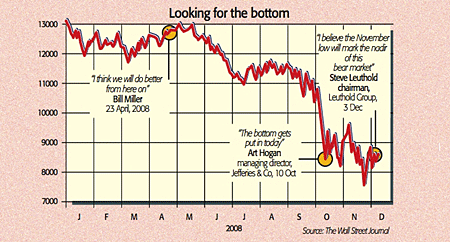Get the latest financial news, insights and expert analysis from our award-winning MoneyWeek team, to help you understand what really matters when it comes to your finances.
You are now subscribed
Your newsletter sign-up was successful
Want to add more newsletters?

Twice daily
MoneyWeek
Get the latest financial news, insights and expert analysis from our award-winning MoneyWeek team, to help you understand what really matters when it comes to your finances.

Four times a week
Look After My Bills
Sign up to our free money-saving newsletter, filled with the latest news and expert advice to help you find the best tips and deals for managing your bills. Start saving today!
Stockmarkets used to be addicted to interest-rate cuts by the Federal Reserve, says Edward Hadas on Breakingviews. But the effect of this drug has worn off due to the seized-up banking system. This Monday, markets got high on a fiscal stimulus instead. Asian and European markets jumped by up to 8% after incoming president Barack Obama announced a "blood infusion" for the US economy set to include the biggest investment in national infrastructure since the 1950s. The programme is thought likely to cost more than $500bn, or 3.5% of GDP.
So are investors right to get excited? As Capital Economics points out, America has already had a substantial stimulus in the form of tax cuts, 1% interest rates and a boost to real incomes from lower petrol prices. But we've still just seen the worst monthly job losses in over 30 years. A major worry is that consumption comprises over 70% of the economy and debt-soaked consumers are retrenching rapidly: a survey covering 37 major stores reported the worst annual decline in same-store sales since 1969 in November. Rattled by the loss of wealth from stock and housing-market slumps, they are finally concentrating on rebuilding their savings. This new-found caution is unlikely to dissipate in a hurry, as it marks "a generational change", says Howard Simons of Bianco Research.
In all, private-sector spending is set to shrink by $600bn in 2009, according to David Rosenberg of Merrill Lynch. Don't count on the latest stimulus stopping the recession "in its tracks". Elsewhere, Europe has been dragging its feet on fiscal measures, notes Capital Economics. The eurozone has called for a fiscal boost worth 1.5% of GDP, which is unlikely to make a real difference even the IMF has called for a global fillip of 2% of GDP.
MoneyWeek
Subscribe to MoneyWeek today and get your first six magazine issues absolutely FREE

Sign up to Money Morning
Don't miss the latest investment and personal finances news, market analysis, plus money-saving tips with our free twice-daily newsletter
Don't miss the latest investment and personal finances news, market analysis, plus money-saving tips with our free twice-daily newsletter
In the meantime, grim data continue to pile up all over the world, heralding yet more disappointments on the earnings front. The pressure on firms is reflected in Moody's recent estimate that the default rate among companies with junk credit ratings will surge threefold in the US to 11.4% and ten-fold in Europe to 9.7% in the next twelve months. Plenty more earnings downgrades are set to rattle investors as global profits are still expected to grow by 8% next year.
There is unlikely to be a sustainable bull run until the extent of the earnings and economic downturn becomes clearer, and "this visibility may take some time to emerge", says Citigroup. That's putting it mildly, given the threat of deflation in America and Britain amid the deepest global downturn since the war. There would also have to be a recovery in credit markets before we can be sure we have touched rock bottom, says John Authers in the FT. The hunt for the end of the bear market (see chart) is far from over.

A broader point is that we may in future have to get used to lower valuations. As Bill Gross of Pimco points out, stocks are cheap in the context of an economy fuelled by cheap debt and little regulation, but now we are heading into an era of "more regulation, lower leverage, higher taxes and a government checkbook" that "crowds out" the private sector, undermining innovation and productivity. That implies lower profits and valuations, hampering equities. All of which suggests that once we're through this seriously nasty bear market, the next bull market will be one of history's less spectacular market upswings.
Get the latest financial news, insights and expert analysis from our award-winning MoneyWeek team, to help you understand what really matters when it comes to your finances.
MoneyWeek is written by a team of experienced and award-winning journalists, plus expert columnists. As well as daily digital news and features, MoneyWeek also publishes a weekly magazine, covering investing and personal finance. From share tips, pensions, gold to practical investment tips - we provide a round-up to help you make money and keep it.
-
 Should you buy an active ETF?
Should you buy an active ETF?ETFs are often mischaracterised as passive products, but they can be a convenient way to add active management to your portfolio
-
 Power up your pension before 5 April – easy ways to save before the tax year end
Power up your pension before 5 April – easy ways to save before the tax year endWith the end of the tax year looming, pension savers currently have a window to review and maximise what’s going into their retirement funds – we look at how

